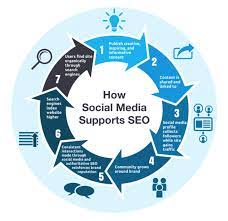Unlocking the Synergy Between Social Media and SEO for Digital Success
Social Media and SEO: A Powerful Combination for Digital Success
In today’s digital landscape, social media and search engine optimisation (SEO) have become integral components of any successful online marketing strategy. While they may seem like distinct entities, the truth is that social media and SEO are closely intertwined and can work together synergistically to boost your brand’s visibility and reach.
The Relationship Between Social Media and SEO
Social media platforms are not directly part of Google’s search algorithm, but they do play a crucial role in influencing your website’s SEO performance. Here’s how:
- Increased Website Traffic: Sharing your content on social media channels can drive traffic to your website, which in turn can improve your site’s authority and relevance in the eyes of search engines.
- Enhanced Brand Awareness: Building a strong presence on social media can increase brand visibility, leading to more brand mentions and backlinks – both of which are important ranking factors for SEO.
- Engagement Signals: Social signals such as likes, shares, comments, and overall engagement on social media posts can indicate the quality and relevance of your content to search engines.
- Local SEO Benefits: Social media profiles also contribute to local SEO efforts by providing valuable information about your business that search engines use to determine local search rankings.
Tips for Integrating Social Media with Your SEO Strategy
To maximise the impact of social media on your SEO efforts, consider the following tips:
- Create High-Quality Content: Produce engaging and shareable content that resonates with your audience on both social media platforms and your website.
- Optimise Your Social Profiles: Ensure that your social media profiles are complete, consistent, and include relevant keywords to improve their visibility in search results.
- Encourage Social Sharing: Make it easy for users to share your content by including social sharing buttons on your website pages.
- Monitor Performance Metrics: Track key metrics such as website traffic from social media, engagement rates, and backlinks generated from social platforms to measure the impact of your efforts.
The Future of Social Media and SEO
As search engines continue to evolve their algorithms to deliver more personalised and relevant results to users, the relationship between social media and SEO will only grow stronger. By leveraging the power of both channels effectively, businesses can enhance their online visibility, build brand authority, and ultimately drive more organic traffic to their websites.
Top 5 Tips for Enhancing SEO through Social Media Integration
Social Media
In the realm of SEO, utilising social media platforms effectively can significantly impact your online presence and search engine rankings. By actively engaging with your audience on social media channels, sharing valuable content, and encouraging interactions, you can enhance brand visibility, drive website traffic, and improve engagement signals that are crucial for SEO performance. Integrating social media into your overall digital marketing strategy can amplify your reach and boost your website’s authority in the eyes of search engines, ultimately leading to a more robust online presence and increased organic traffic.
Social Media
When it comes to enhancing your SEO strategy, leveraging social media platforms can be a game-changer. By actively engaging with your audience on social media, sharing valuable content, and encouraging interaction, you not only boost brand awareness but also create opportunities for increased website traffic and valuable backlinks. Social media serves as a powerful tool to amplify your online presence and influence search engine rankings positively.
SEO
When it comes to leveraging social media for SEO purposes, focusing on search engine optimisation (SEO) is essential. By incorporating relevant keywords, meta tags, and high-quality content into your social media posts and profiles, you can enhance your online visibility and improve your website’s ranking in search engine results pages. Consistency in applying SEO best practices across both social media and website content can lead to increased organic traffic, better engagement metrics, and ultimately, a stronger digital presence for your brand.
SEO
Search engine optimisation (SEO) is a fundamental aspect of any successful digital marketing strategy. By incorporating SEO best practices into your social media efforts, you can enhance the visibility and credibility of your brand online. Optimising your social media profiles with relevant keywords, creating high-quality content that resonates with your audience, and encouraging social sharing can all contribute to improving your website’s search engine rankings. When SEO is integrated effectively with social media activities, businesses can experience increased website traffic, improved brand awareness, and better engagement metrics – all essential components for achieving digital success in today’s competitive online landscape.
SEO
Search engine optimisation (SEO) is a fundamental aspect of any successful digital marketing strategy. By implementing SEO best practices, businesses can improve their website’s visibility in search engine results pages, drive organic traffic, and enhance their online presence. SEO involves a combination of on-page optimisation, quality content creation, link building, and technical enhancements to ensure that a website ranks well for relevant keywords. By focusing on SEO, businesses can attract more qualified leads and ultimately increase their chances of converting visitors into customers.

